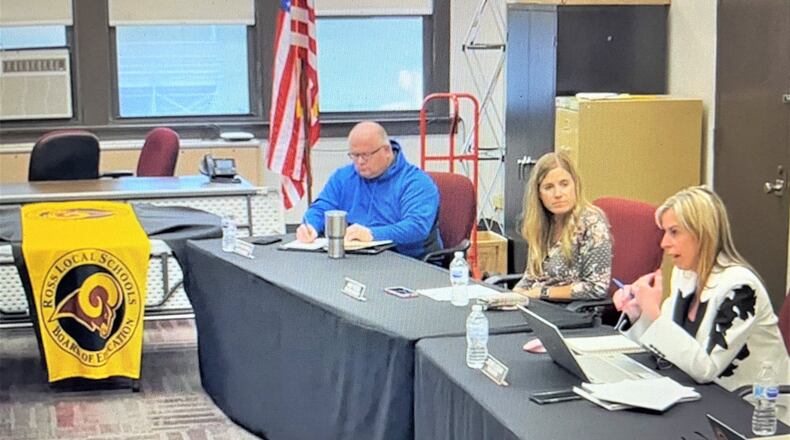Ross is in “financial crisis,” said the district’s top financial officer.
Under Ohio school law, districts must resolve significant projected budget deficits by seeking local voter approval for higher school taxes.
If more local tax revenue cannot be generated, the state will increasingly take control of a local district, removing its usual operating autonomy and ordering deeper budget cuts until the school system returns to solvency.
Ross’ looming shortfalls, combined with ballot tax levy defeats in August and November of last year, now has the district on the May 2 ballot with its largest proposed tax hike yet – a 9.4-mill property tax to fund the operating costs of its five schools.
Moreover, Ross is now considered by the Ohio Department of Education to be in “fiscal caution,” which is the first of three state categories for districts facing insolvency, said Ross Treasurer Jenni Logan during Monday’s school board work session.
If more local tax revenue cannot be generated, the state will increasingly assume control of financial operations, forcing more personnel and program cuts in the subsequent state categories of “fiscal watch” and “fiscal emergency” until budget deficits are eliminated.
“By the end of this month (Tuesday) we have to approve a written plan (for fiscal recovery) and file it with the state of Ohio,” said Logan.
The projected budget deficits range from $791,629 in 2023 and increase to $2,460,709 in 2024 up to $5,758,818 in 2027.
Ross’ plan is designed to eliminate the fiscal deficit by 2025 in large part through the proposed passage of May’s 9.4-mill tax levy.
“We are going through internal and external investigations and studies to look at what we can do about this financial crisis,” said Logan, who added: “but Plan A is the levy (passage).”
“If Plan A is successful, then none of this matters.”
The Ross Board of Education approved district’s fiscal caution report by a 4-0 vote with member Andrew Schnell not in attendance.
The board also announced a special meeting to discuss details from a soon-to-be-completed state audit for 6 p.m. April 12 at Ross High School. The meeting is scheduled to include talks on possible budget cuts for the 2023-2024 school year.
In recent weeks, the state has already initiated meetings between Logan and a state education department financial consultant assigned to oversee Ross’ finances.
“We have gotten lots of feedback already,” said Logan.
About the Author

